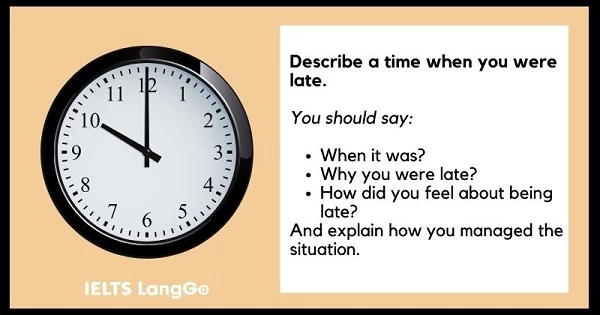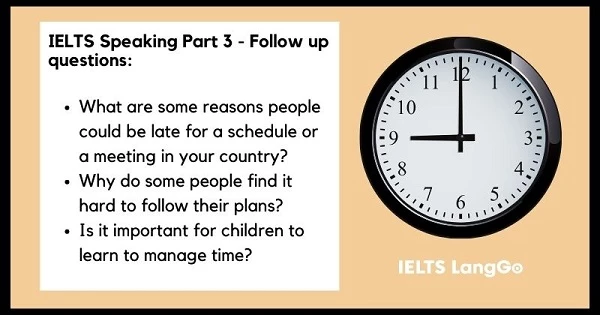


Describe a time when you were late là một trong những câu hỏi thường gặp trong phần thi IELTS Speaking Part 2. Để chinh phục đề bài này và các follow-up questions trong Part 3, các bạn cần trang bị cho mình ý tưởng và từ vựng để diễn đạt các ý tưởng đó.
Ngay sau đây, IELTS LangGo sẽ mang đến cho bạn bài mẫu Part 2 và các câu trả lời cho phần follow-up questions từ thầy giáo 8.0 IELTS để các bạn tham khảo nhé.
Describe a time when you were late là câu hỏi thuộc Topic lớn Event của IELTS Speaking Part 2. Tương tự như các đề bài khác trong Part 2, bạn nên bám sát các gợi ý cue card để lên ý tưởng cho phần nói của mình.
You should say:
And explain how you managed the situation.

Sample Answer:
This incident is actually not something I am particularly proud of. I'm gonna say it happened like a month ago or something like that, and it has to do with a show called IFO (IELTS Face-Off) - you probably have already heard of it.
Before the show was actually aired, we had a bunch of training sessions with the producer. On this one Saturday of May, he asked people to arrive at his house at 10am. I was like “Yeah, sure, no problem” because even though I’m not a morning person, I definitely could do something to manage that.
On that day, I woke up at 8am and then I did my morning routine. It was really smooth, nothing wrong happened here. At 9am, I started to go to his house. As I finished a third of the distance, that is where the disaster started - it rained.
I was wearing a white T-shirt on that day, which is definitely not really good. I didn't want to look dirty when I arrived at his house. So what I did was I pulled over the raincoat, and put it on. And then things started to accelerate in a very negative way. I don't know why but the raincoat was designed in a way that's going to restrict a lot of body movements, which made it really inconvenient for me to move around.
I know I did things really flimsily, I remember that I kind of dropped my bag as well as my equipment a couple of times along the way and I needed to pick it back up. I was so pissed off, that was so irritating but I couldn't do anything about it. I remember when I almost got there, I pretty much cried out loud before how pitiful it could have been to me.
But then, come rain or shine I needed to arrive at his house anyway. And I was like, 15 minutes off: I arrived there at 10:15, well it actually was not that big of a deal - the producer actually kind of predicted my tardiness. The camera did not roll until 10:30 so no harm was done. But that was a time when I was pretty much late to something.
Vocabulary Highlight:
Như các bạn đã biết, các câu hỏi trong Part 3 sẽ liên quan đến cue card Part 2. Vì vậy, IELTS LangGo đã tổng hợp các câu hỏi thường gặp về chủ đề này trong Part 3 kèm câu trả lời mẫu.
Các bạn tham khảo cách triển khai ý và sử dụng từ vựng nhé.

Q1: What are some reasons people could be late for a schedule or a meeting in your country?
That’s actually quite a relatable question, because I came up with a lot of excuses for them. I’m not a really punctual person I would say. There are a couple of reasons people frequently give, but the most commonly used one probably is traffic jams. I mean, from a more objective perspective, that is actually very understandable.
Vietnam is a developing country and our traffic infrastructure is actually not that high quality. There're so many narrow roads, and there’re also others - they're not asphalt roads, they are concrete roads - if I'm not mistaken, which are actually very hard to go on. Because of that reason, accidents actually are quite frequent and this is just not about accidents, there're also jams and sort of certain traffic effects - some I did not want to explain or talk further about any more here.
But to wrap things up a little bit, the roads are not in their best condition in order to facilitate such a huge volume of commuters and especially during rush hours, this is more true than ever. People are held up in the traffic and they cannot arrive at their destination on time and that's definitely one of the most commonly used excuses when we arrive late.
Vocabulary Highlight:
Q2: Why do some people find it hard to follow their plans?
There are plenty of reasons, but the thing that attributes the most probably is going to be discipline, or actually a lack thereof. Because I will say this, you know man plans and god laughs right? I feel like all the plans, even with the best visualisation or visionary, there are still hidden obstacles that pretty much are very unwelcomed and unexpected that they can’t foresee.
Because of that reason, the plan is somehow delayed for a certain amount of time. Now a person with discipline definitely is going to find a way through, they are going to try different strategies in a very continuous and willing way. They would not back down whereas other people, they look at the signs and be like “Oh, this must be God not wanting me to do this, I will just stop”.
In a more serious voice, I feel like discipline has a lot to do with the mindset. People who actually can follow through with their plans, they are the ones with a very strong mindset to carry out their plans. And the vice versa is also true, those who do not have a suitable mindset are going to back down when things happen not according to the plan.
Vocabulary Highlight:
Q3: Is it important for children to learn to manage time?
Yes, I think so. Time is definitely the number one enemy of plans, especially the shortage of time, how we all have to cram for our plans. But let's just say that in today's world, there’re so many plans devised and so many things that people have to work according to, and managing time is pretty much an essential skill set that people should have now.
The older that we get, I feel like the more tardy mindset that we kind of have. And more importantly, if you miss too many deadlines or if you're used to being late in the past, chances are that people will find it actually acceptable to be so or to do so in future circumstances.
And they thought to themselves, if they can pay off these circumstances so why do they have to push themselves to the point where they have to cram for the timeline. It's all about the mindset, it's all about a habit of not being late or being late at the same time.
So why is it so important for children to learn? Because they are like white, blank sheets of paper. They don't have that mindset, and again I cannot emphasize enough how disastrous that mindset can be to a person's performance, not only at school, but also at work and stuff like that.
So children again are blank sheets of paper, it's very easy for us to instill into them a sense of responsibility with time - not just their time but also other people's time. It’s very responsible of them to attend a meeting on time, or to meet with people at the right destination, at the right time.
They are not subjected to any source of negative complacency - as I have already stated before, those who had the mindset of being okay with being late. It's very important for children to learn how to manage time when they’re still young, when they’re not affected by those negatives.
Vocabulary Highlight:
Như vậy, chúng ta vừa cùng giải đề Describe a time when you were late với 1 bài mẫu cho phần cue card Part 2 và các follow up questions trong Part 3.
IELTS LangGo tin rằng cách triển khai bài nói và các từ vựng trong các câu trả lời mẫu sẽ giúp bạn tự chuẩn bị cho mình những câu trả lời “ăn điểm” cho đề bài này. Chúc các thành công!



ĐẶT LỊCH TƯ VẤN MIỄN PHÍ LỘ TRÌNH Săn ƯU ĐÃI lên tới 12.000.000đ